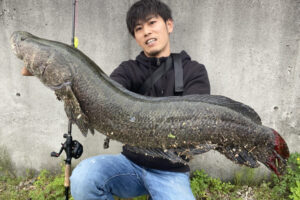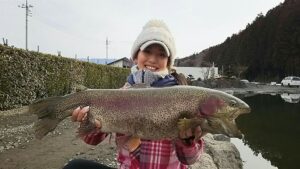Engaging Children in Angling
In my article, Statistics on Angling in Japan, I showed the declining angling population in Japan. Under this circumstance, the angling industry is working to re-activate this leisure. One of such actions is to try to engage children into fishing. In this article, I will introduce such activities.
Angling as a preferred activity for children
Since angling is a very popular choice of leisure activity (ranked 1st among leisure activities people want to try, according to White Paper on Leisure,) many parents are naming angling as a preferred activity for their children to do.
With the background that children have less and less outdoor plays and activities to make their physical ability poor, many adults feel like giving next generations chances to engage in some kind of outdoor activities. It supports our industry to start or continue various events for children.
To involve more families into fishing, the angling industry is offering various fishing schools.
Fishing and angling events
There are organizations who run their fishing club with schools. Below are such organizations.
D.Y.F.C (Daiwa Young Fishing Club)
This is outstandingly the biggest fishing club for children in Japan. It is run by Globeride, who sells Daiwa branded products. It had been found in 1976, and they started regular fishing schools from 2005. Currently, there are about 16,000 children registered.
Children from 6 years old to 15 years old (elementary schoolers and junior high schoolers) can join the club, and they can be in the club until they become 19 years old. Entry fee is 1,000 JPY, with original caps and seasonal brochure included. This entry expires in three years, and renewal cost is also 1,000 JPY. And only registered members can enroll in the fishing school events.
They hold 13 to 15 schooling events yearly, all over Japan. Target fish in each school varies from simple fishing from the pier and area trout fishing to boat fishing. The necessary tackles needed for schooling events are available as rental options, and children do not have to buy the specific tackles for the venue.
To join these events, schooling is free, and what you need to pay is for travel and entrance cost of the fishing place or cost of the boat.
What is significant of D.Y.F.C. is that, during schooling, children are not with parents. Parents bring their child to the venue, leave it in the school, and then they pick it up after fishing.
This club is run by Tackle Berry, a fishing tackle chain store, with support from 23 companies of the angling industry.
People over 6 years old can join this club, free of charge. Members can join the events run by 7 regional offices, each of whom hold 3 to 4 events yearly. They have rental tackles, and it is also free.
This fishing school is open to anyone, children and adults. And it is not a school for children, but it provides a very good occasion to let family or parent-child engage in angling.
This is another club which offers schooling for parent-child novice groups. It organizes boat fishing events in Kanagawa.
It is event based, and there is no registration required. There are rental tackles, and safety equipment available. It is a great help to experience boat fishing for the first time, since this fishing requires special tackles, such as electric reels etc.
Enjoy fishing together with parent and child
This is run by JOFI (Japan Official Fishing Instructors) Association Kanagawa. In Japan, there is a public certification of fishing instructor, JOFI, and only qualified people can call themselves as an official instructor. There is an association for organizing official instructors, and 25 branches of the association carry out their activities to keep and activate fishing.
The Kanagawa sector of this association runs events for parent-child anglers. They offer their schooling free, and the cost paid by the participants is for the tackle and expenses of the venue (angling ticket or boat.)
Other fishing school events
In addition to the above organized events, there are many more occasions to learn fishing. According to Japan Sportfishing Foundation’s website on schooling events, there are 19 events planned in October 2023, for example.
Many of these events are held in artificial fishing areas, such as area trout and so-called fishing parks on the sea. They are offering a safer environment and resting facilities (benches, toilets etc.)
Effects of fishing activities on children
Since the general interest in fishing is relatively larger in Japan, there are many commentaries about the positive effect of fishing activities.
It is said that it raises the curiosity of children, through fishing. Interactions with fish, thinking about fish, wondering about fish activities, trying to consider how to catch, experiencing trial-and-error and so on. These activities stimulate children’s cognitive or intellectual abilities, to train their thinking to get better.
Additionally, fishing activities are very good to learn about their food. Eating fish is a very important factor in Japanese culture. To know about fish more, through fishing, means to know the important part of our own culture better. This is often raised as an argument to support fishing activities.
For those who have interest in such commentary, please visit below Japanese pages with browser translation.
- Comments of neuroscientist, on a business magazine.
- Outdoor web magazine site.
- Web magazine on educational theme
- Websites on childcare
Your guess is right. These contents are driven by the fishing industry or outdoor industry. And we need to see it more carefully.
As a statistical information, there is a survey about how the childhood experience of fishing affects attention to environmental issues in its later life. The result shows that families who have fishing experiences speak about environmental matters more than families who have no experience of it. 84% of families with fishing experience bring topics about environmental matters such as the importance of the natural environment. And the majority of mothers (68%) think that the fishing experience contributes to letting children learn about environmental issues. This survey is done by the Japanese Association of Certification on Fish.
This survey is showing that mothers, who were subjects of this survey, talk more about environmental topics. And the degree of it was more when a family had let their child experience fishing. Fishing is considered to be one good activity which is connected to the natural environment.
Summary
In the current environment around children, they have various attractive things. Under these circumstances, the Japanese angling industry is offering many events for newbies including children. To enhance this movement, other aspects such as fishing places with proper target fish, cost of angling, and making fish-eating revive (currently it is decreasing) is required. Small vision only from angling industry is not enough and involvement of other industries is crucial for further growth of angling and fishing, in Japan.

